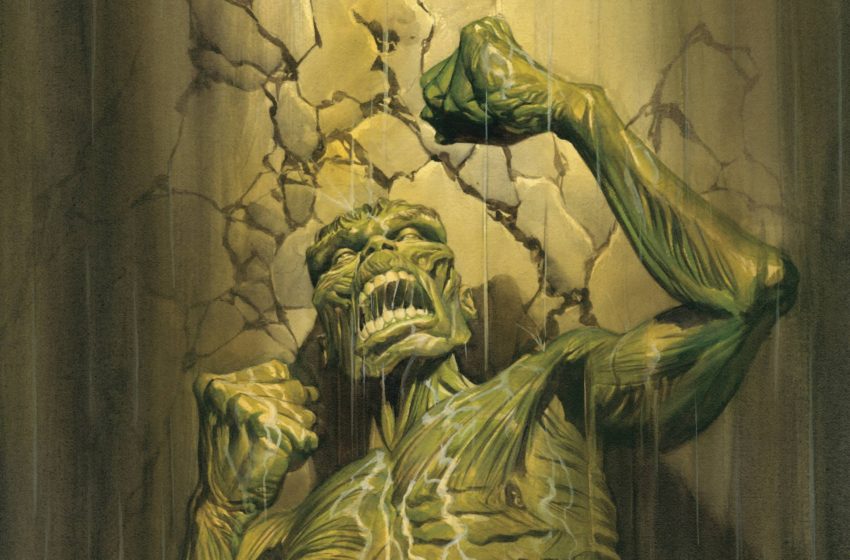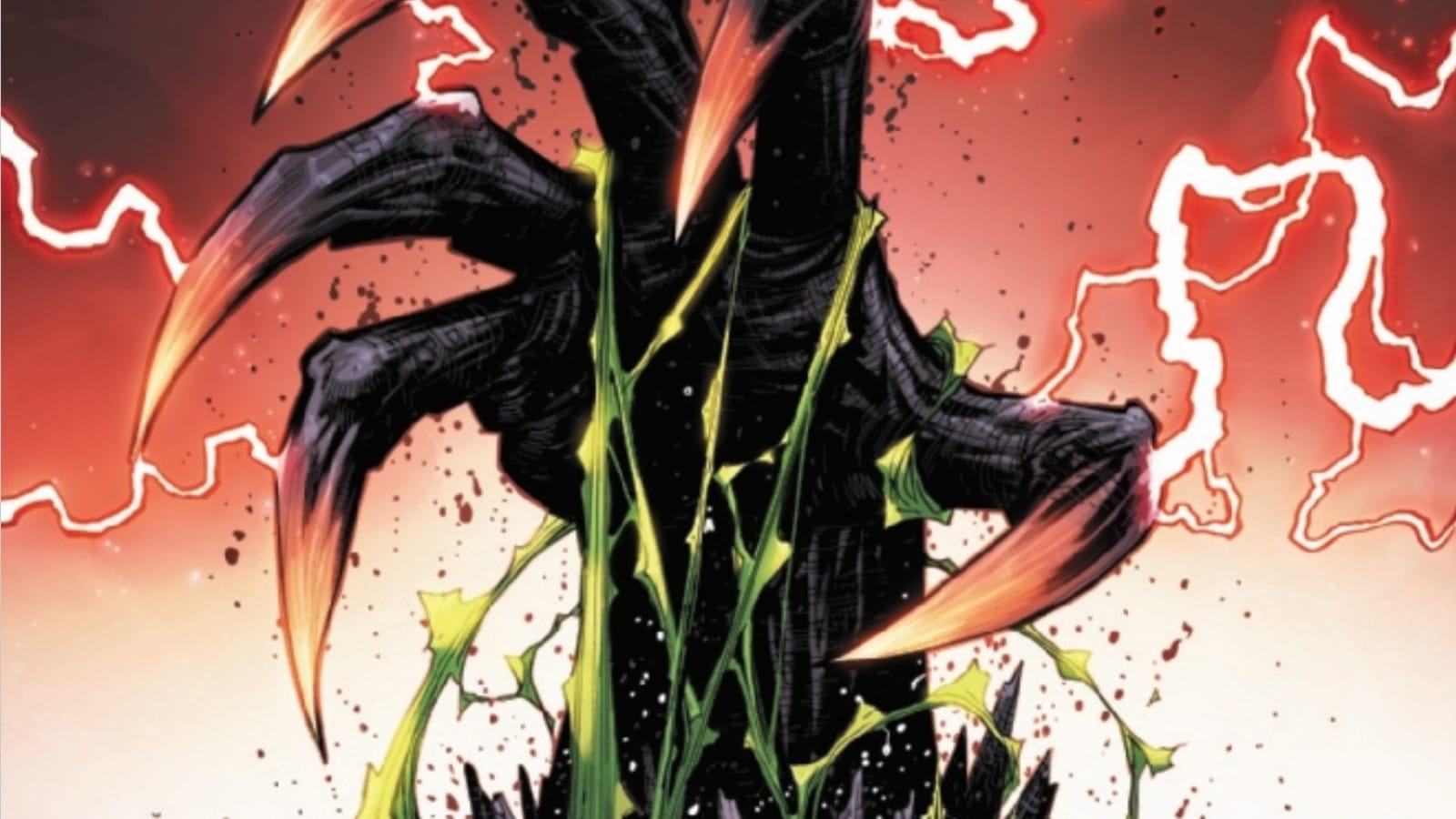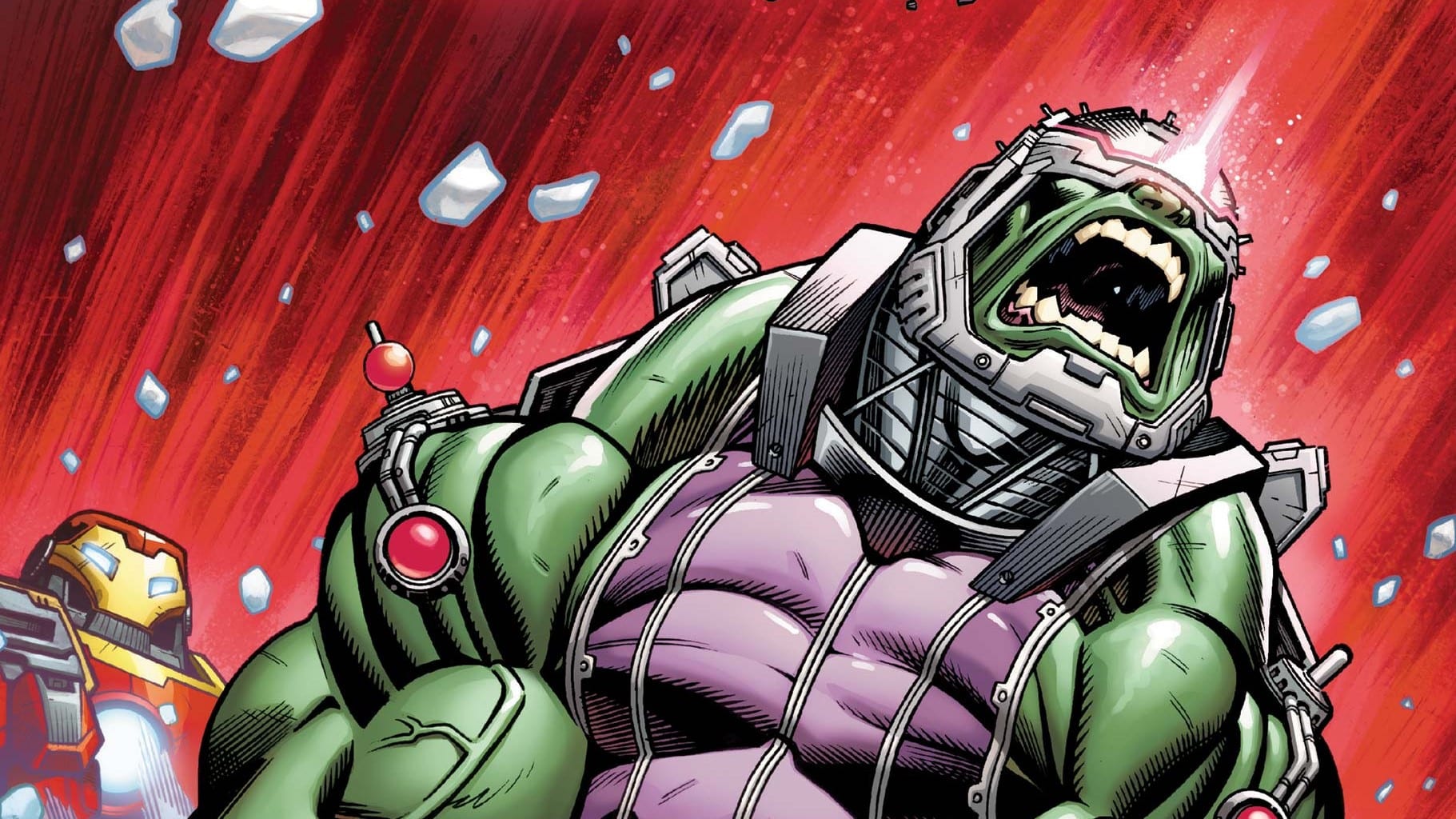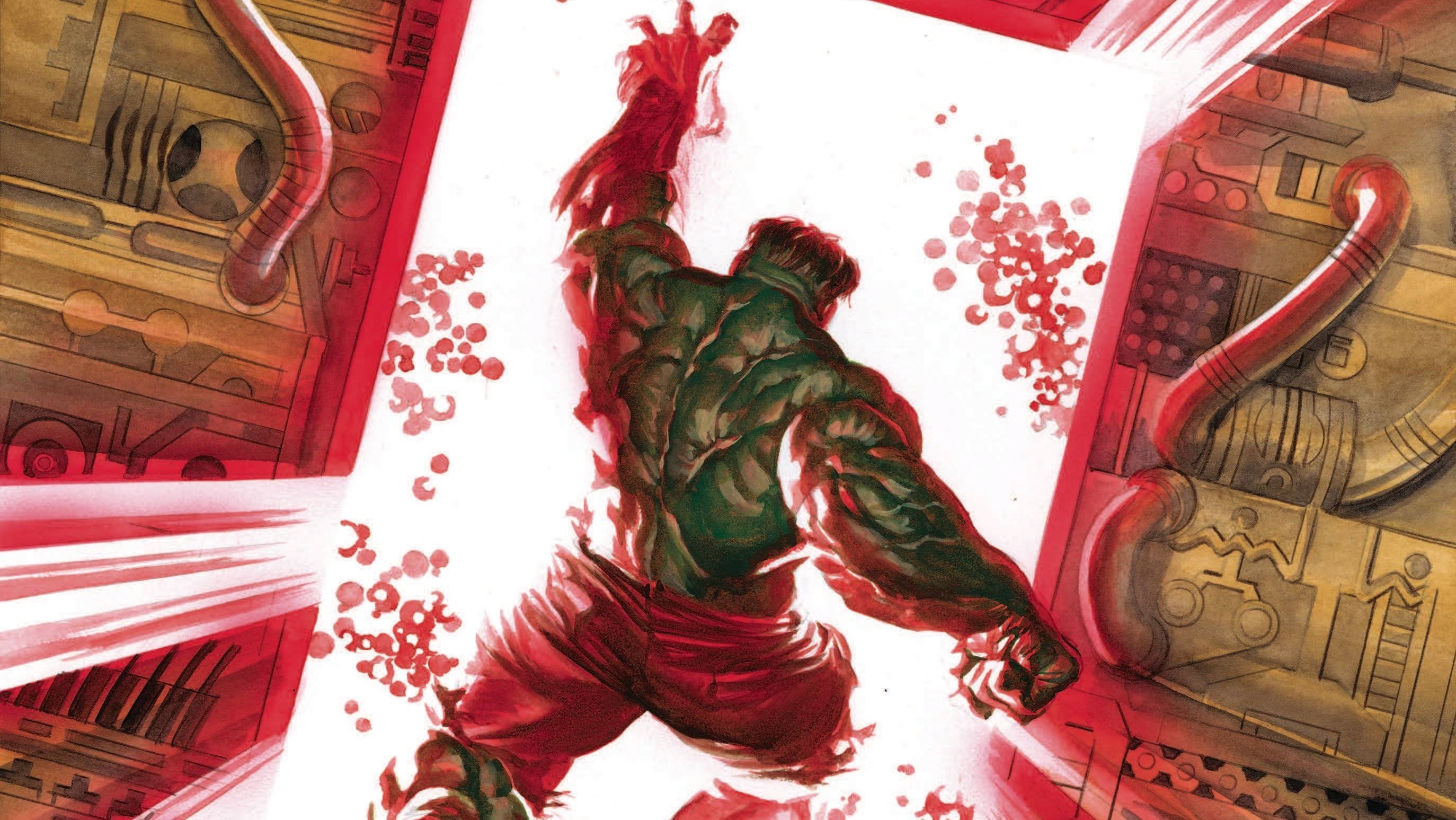The battle below continues as Hulk and Joe Fixit scrap against the Leader in Immortal Hulk #45, written by Al Ewing, pencilled by Joe Bennett, inked by Ruy José and Belardino Brabo. with colors by Paul Mounts, and letters by Cory Petit
Cori McCreery: Hey Rob! We didn’t burn the place down while you were away! Aren’t you proud?
Rob Secundus: Of course you didn’t, Cori; this is Times Immortal, where we talk about the Hulk in Hell, and the fires of hell are made of the flame eternal, the blaze which burns but does not consume.
The Lowest Ebb Is The Turn Of The Tide

RS: I need to say this up front: I don’t care for Longfellow. I haven’t read much of his poetry, and I don’t like that which I’ve read, and I don’t know much about his life, other than that he is, thank God, in the ground, unable to write anything more. I can offer a few ideas though, about why he’s an interesting guy to find in an Immortal Hulk comic, and why this specific passage is of some interest.
First of all, if you’ve read any Longfellow, it likely was Longfellow doing translation; he’s the most famous translator of The Divine Comedy into English, and schools love assigning his translation, because it’s in the public domain, and thus cheap. I do not find the translation very accurate or enjoyable. But it’s noteworthy that he’s Dante-adjace.
Second of all, “Loss and Gain” is an interesting poem for an issue like this. The quoted line is pretty clear; it’s a Darkest Before the Dawn sentiment in this near climactic issue where it briefly seems that The One Below All has fully triumphed before things finally turn around for our satanic heroes. The poem is quite short, so, if our editor allows us the indulgence, I’ll quote it in its entirety here:
When I compareWhat I have lost with what I have gained,
What I have missed with what attained,
Little room do I find for pride.
I am aware
How many days have been idly spent;
How like an arrow the good intent
Has fallen short or been turned aside.
But who shall dare
To measure loss and gain in this wise?
Defeat may be victory in disguise;
The lowest ebb is the turn of the tide.
It’s a poem about humility, placed here in a moment where a Satanic figure’s pride precedes his fall. It’s a quiet, melancholic poem in an issue that is mostly after a major battle, in the moment when the Hulk is an empty corpse. And it’s a poem about our limited perceptions. The quoted line is one of certainty, but that line is only the back half of a sentence; it really begins “Defeat may be victory in disguise” after the narrator asks who could possibly measure these sorts of things, excoriating his earlier measuring behavior. The turns of the tide are proof that we can’t be certain that loss is always a permanent thing. We know some things in the world don’t work that way, so when we’re presented with loss, it’s best not to make assumptions. And in this comic we, the antagonist, and the protagonists are all confronted with challenges to our assumptions. The central cycle of the series, death and life, and the central macguffin of the series, infernal gamma, both don’t quite work the way we thought. There’s a bigger picture of not just greens, but also reds, of a whole band of cosmic radiation, of celestial as well as infernal designs.
CM: And once again, I’m the literature and religion neophyte here. But what I can take from your eloquent analysis here is this: we know the Hulk is in more dire straits than he has been at any point in this series, but this quote is an opening reassurance that things might not be so bad. And in fact, our opening scene revolves around Betty apparently coming to the rescue, which is a nice opening coda even if it doesn’t pay off this issue. What did you think of her ferry ride?
RS: Well, I can tell you that I did not enjoy seeing it begin with a nod to one of my least favorite comics creators of all time. I honestly don’t know what to think of it; it felt like a real classic Marvel Comics Do An Ode To New York City, Where Marvel Comics Are Set, but New York hasn’t been vital to this run. It’s been the primary setting of the last couple of issues, but that’s it. What did you think of it?
CM: My feelings on the creator mentioned are numerous and none of them are good. I think he’s an overhyped hack who relies too much on pop culture gags that age poorly five minutes after publication, and his own racist screed five years ago validated my opinions on his body of work. But feelings about that creator aside, I agree that this sequence just felt kind of out of nowhere? I suppose if they’d paid it off with Betty showing up before the end of the issue it may have fit better, but then it would have taken away from the actual big reveal. Maybe you could have just used these two pages to do something else.
RS: Yeah. Though maybe it’s one of those pieces that will get better later— when we see the full structure of this arc and see the payoff of Betty flying off, and when we have some distance to see why this last act is set around New York.
Phantasmagorical Fauna

RS: We get to see a bit more of Jackie’s power in this issue, learn how it functions, and learn just what it is that she sees. Cori, what do you think of her gamma-induced ghostly sight?
CM: I think hers is a uniquely interesting Gamma power, and one that fits her character so well. As a journalist (even though as she reminds us that she’s currently unemployed), her role throughout this series has been to suss out the hidden truths of the terrifying world she’s become a part of, and this is a natural extension of that. It’s also a running theme of some of the Gamma power sets in this book being direct extensions of a character, most notably seen elsewhere with Betty as the personification of angry feminine rage.
RS: The new detail about stress leading to her being unable to control it also felt very real to me. My journalist friends often have a hard time of shutting things out. They see the worst of the world (and sometimes the worst of the world sends them death threats). That kind of vision can be as traumatic as it can be powerful.
CM: It’s another cyclical thing, which seems to be a constant theme here. Seeing terrible things will cause stress. Stress will cause her to lose control of the Gamma sight and see more terrible things. A cycle of terror she can’t escape from, of seeing unending horrors. Her own personal hellscape she must endure due to her proximity to the sins of mankind, despite being one of the most innocent characters of this series.
RS: What do you make of these nightmarish creatures being (not entirely, but in large part) human ghosts? That is not what I thought they’d be when we first saw them.
CM: It’s definitely an interesting aspect to the power, but it’s also clearly not all of her power, since she could also see what was wrong within Rick. I think it’s that she can see primordial forces at work throughout the world, but our limited understanding of those forces best conveys them as ghosts. Either way, it’s an immensely creepy power, and I can see why she sees it as a curse.
I’m Gonna Fix-It!

CM: Speaking of curses, the other big chunk of this issue happens in the Below-Place with Joe and Child, and provides us with some absolutely horrific imagery. What did you think of their escape attempt?
RS: It was sheer desperation against overwhelming and impossible odds; ultimately, it was sheer conviction and rage below tied with serendipity above. That kind of raw emotion and defiance is, I feel, at the core of the character. That kind of cathartic turn. Did you enjoy that climax?
CM: I’ve got to say that I was completely blown away by the reveal, especially since Joe has been in Banner mode this entire series, so to see him finally cut loose and unleash the monster within was very exciting. I’m also curious as to how Joe became the Red Hulk, since to my very limited Hulk knowledge, isn’t that Thunderbolt? It’s also interesting that once Joe does break down the Leader’s Red Door and returns to Earth, the red is constrained to glowing veins and the bright embers set in his eye sockets.
RS: The Red Hulk was, at first, Thunderbolt Ross, and then later the much better General Robert Maverick, in Al Ewing’s and Marcus To’s New Avengers. Ross has been the one major Hulk character absence in this series, though the Hulk did at one point check to ensure that Ross was still in his grave (though there was a corpse there, Ross returned in the pages of Ta-Nehisi Coates and Leinil Frances Yu’s Captain America). So, whatever’s happening here is a change, and, I think, Ewing’s last move to try to bring together all of the Hulk Stuff under one coherent system.
On a practical level, I think the implication of the scene is that Joe’s change into a Red Hulk is inadvertently the doing of the UFoes. The Green Door VS Red Door established an opposition between colors, and the cosmic rays of the UFoes are described as anti-gama, with gama typically associated with the green. It’s at the moment when gama completely leaves the Hulk’s corpse that this transformation occurs. The Hulk that we see on the final page is both Joe and the kid, both red green, powered by things both above and below.
CM: Oh, that makes a lot of sense, and ties everything together in a way I hadn’t managed to yet. It’s one last gasp as the series races towards its ultimate chapter. The countdown has begun, and we have a mere five issues left, and only one more that I’m going to get to discuss with you. I’m a little sad to see this go, as this has been an immensely rewarding experience.
RS: What excites me most is I have no idea where it’s headed next. I don’t know how this wraps up. I can’t wait to see.
Marvelous Musings
- Hey Joe, knock it off with the “cute” Easter Eggs. Peter David is far from saintly, and referencing him as such doesn’t really help in your endeavors to not be seen as racist.
- Nice mutton chops Samson.







